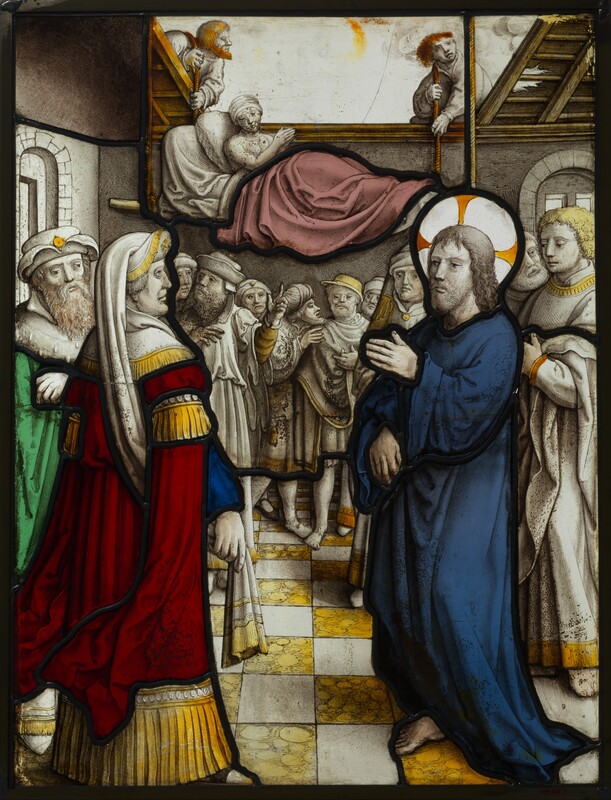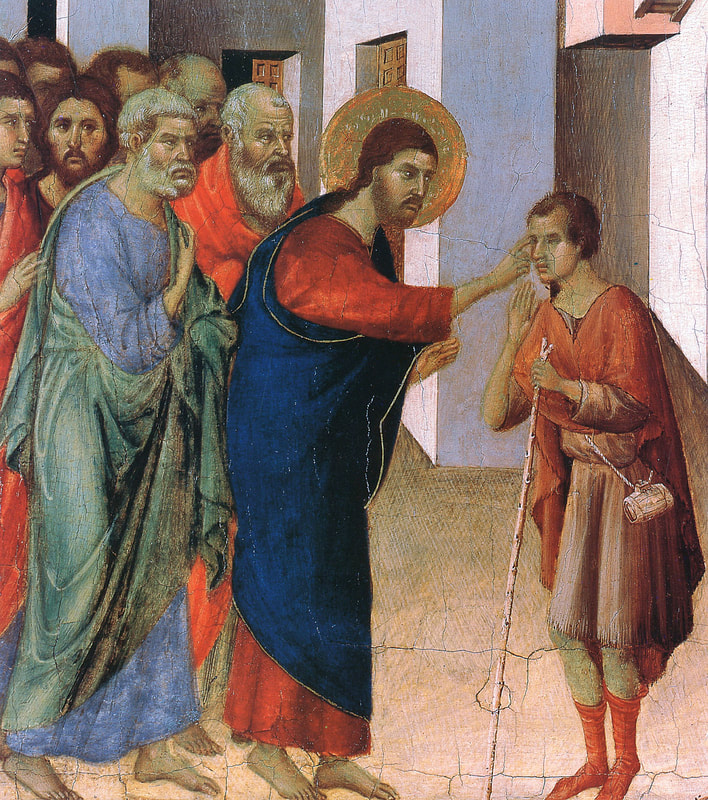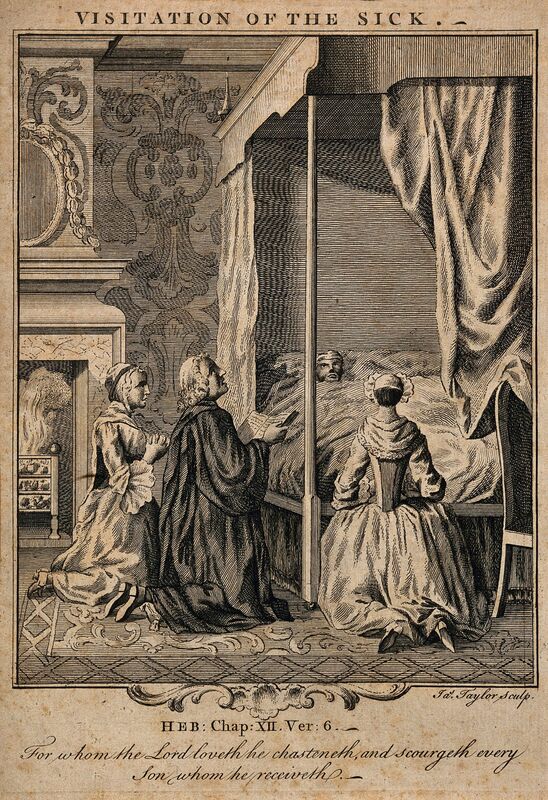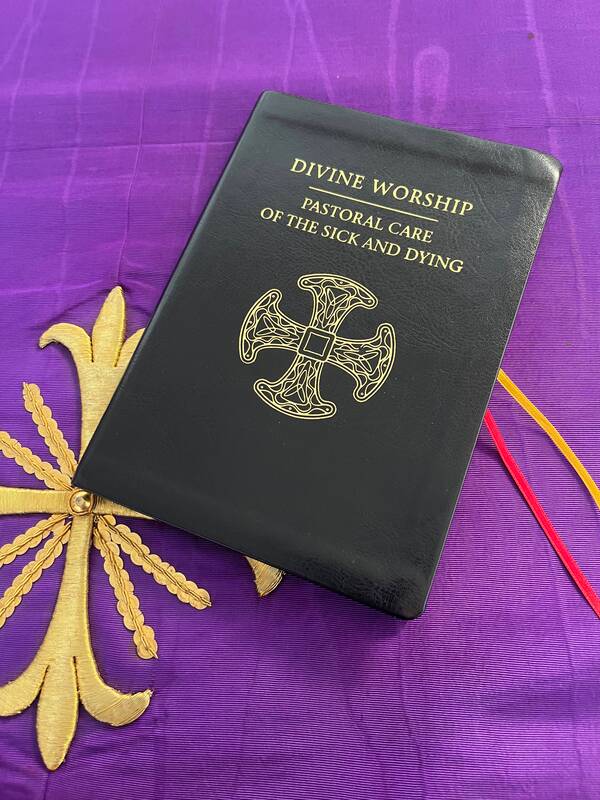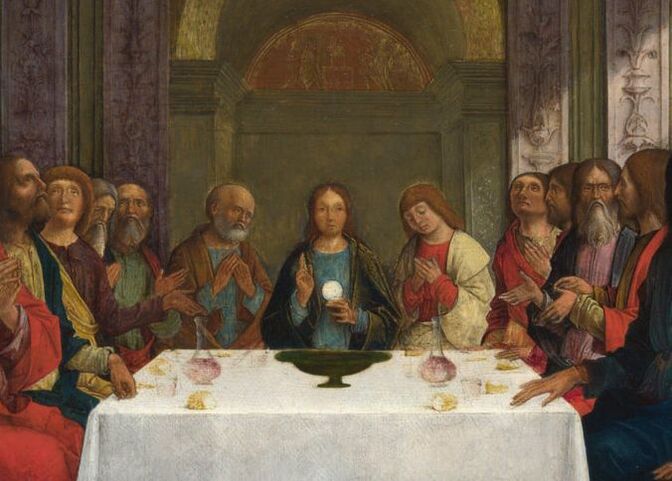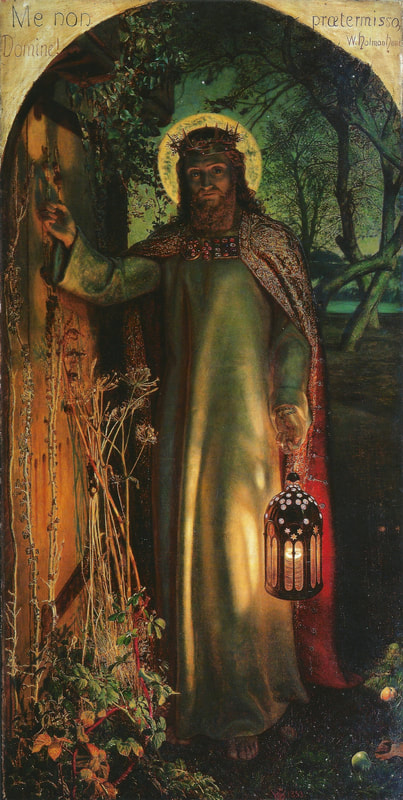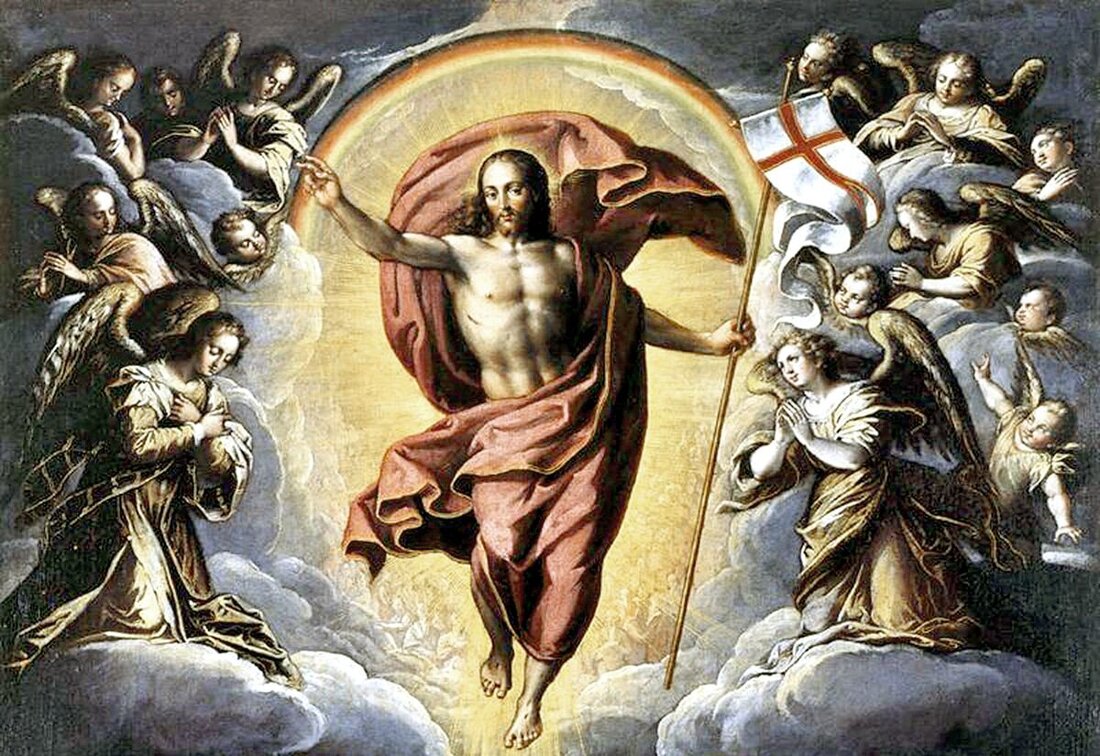Ministry to the Sick
|
THE CARE OF THE SICK AND DYING is a privileged ministry in the Church. Through her ministers, the Church expresses concern, compassion, and hope to the sick and dying and is present to them through visits, prayer, and the celebration of the Sacrament of Anointing and Viaticum.
During his life on earth, Jesus went about preaching and teaching and enabling men to profit by the saving power of his body through contact with it. But once he was risen and glorified, his new heavenly existence did not conform with the life of this world and of the Church on earth. So, in order that men might hear him and that he might act upon them in a way that was natural to them, he had to make use of earthly instruments to make them aware of his presence. Therefore he has certain organs whose function is to communicate his Resurrection life to men. The two means by which he does this are: 1. the Apostles and the apostolic ministry which succeeds them; and 2. the Sacraments, of which the Sacrament of Unction, or Anointing of the Sick, is that instrument which the Risen Lord gives himself to his people for the healing of body and soul. |
The following notes are intended to provide you with instruction for the availing of the great means of grace in this Sacrament, its history, and its practice as found at St John Henry’s.
Anointing in the New Testament
Is any sick among you? let him call for the elders of the Church; and let them pray over him, anointing him with oil in the Name of the Lord: and the prayer of faith shall save the sick, and the Lord shall raise him up; and if he have committed sins, they shall be forgiven him. - James 5.14-15 St James, who wrote these words, is described in the New Testament as ‘one of the Lord’s brethren’. We know by this description of him that he must have had very close and intimate knowledge of Jesus. He would be likely to know as well as any one what Jesus taught and commanded.
The letter in which this passage occurs was probably written no more than twenty years after Our Lord’s Ascension, by which time it is evident that the practice of Anointing the Sick was accepted by the Church as a normal part of the Christian ministrations. |
We are nowhere given any words of Jesus expressly ordering that the sick should be anointed with oil, but we may reasonably suppose that he did so, or that that the Apostles did what they knew to be his wish, as we see from St Mark’s Gospel, ‘So they went out and preached that that men should repent. And they cast out many demons, and anointed with oil many that were sick and healed them’. When the Apostles returned from the mission upon which Jesus had sent them, they reported to him about it, and we read they ‘told him all that they had done and taught’.
These cures should not be seen as something purely. medical; in the thought of those times, there was no distinction between body and soul - man was seen as one. They saw a relationship between sickness and sin, and so the prayer and anointing was seen as ministering to the whole man, bringing him what we would call both bodily and spiritual healing.
These cures should not be seen as something purely. medical; in the thought of those times, there was no distinction between body and soul - man was seen as one. They saw a relationship between sickness and sin, and so the prayer and anointing was seen as ministering to the whole man, bringing him what we would call both bodily and spiritual healing.
Anointing as a Sacrament
|
The outward and visible sign in this Sacrament is oil, applied to the sick person with the Sign of the Cross and prayers for healing. The inward and spiritual grace given is fortification against the power of evil over body, mind, and spirit.
In Baptism we are baptised with the Sign of the Cross in water, the sign of washing and of new birth. In this Sacrament, the sick person is signed with the Sign of the Cross in hallowed oil, the sign of healing and of peace. Prayer is offered for recovery and healing, together with an assurance of God’s grace. Sickness produces a state of weakness in the body with pain and sometimes loss of power in some important organ or member. God has provided natural forces in our bodies to fight the disease. The Sacrament of Unction helps the body to make full use of those forces and material remedies. Victory over the disease may, and often does, result from a devout reception of this Sacrament. Sickness both of body and mind produces strain and fatigue in the mind. Often, a great mental effort is required to quite simple things in times of illness, and it is easy for morbid or depressing thoughts to gain entry. Doctors look to use the mind in the right way to help the body, and in many ways this Sacrament brings strength and peace to the tired, depressed, and sick mind. |
Sickness also brings tribulation of spirit, which can try one’s faith, making it difficult to pray. The shadow of death can bring fear, and the burden of our sins is multiplied by their recurring memory. Often, some spiritual disorder is actually the cause of a sickness and can be traced by a doctor or priest. Into this vital centre of our being Holy Unction brings the fullest healing.
Preparing for Anointing
|
God will always do his part. But we must do ours. We must lay ourselves open to receive God’s help. We must be in that condition which makes it possible for God to help us.
The first step is to have faith. This means simply to trust God, remembering that we are his children, and he has blessings that he wishes to bestow. We must not try to tell him what he ought to do for us, he knows best. We are to trust completely God from whom comes every good and perfect gift. If we have fears, or find it hard to have that perfect trust, we are to tell him. He will understand and set our hearts at rest. The second step is to confess your sins, being ready to confess anything that troubles the conscience. Let no unconfessed sin stand between you and God. Perfect trust does not hide things from Perfect Love. The third step is to pray. We must pray for the priest, the doctors, nurses, and any who will care for us if we are going into hospital, or require medical attention or surgery. We must also ask friends and relations to pray for us. |
Do these things to the best of your ability, and then rest assured that you are ready to receive the Sacrament for the healing of your body, mind, and spirit.
Anglican Patrimony
|
In the Ordinariate, the rites and prayers for use in ministry to the sick and dying are contained in Divine Worship: Pastoral Care of the Sick and Dying, which provides formulas for the Visitation of the Sick, the Blessing of a Sick Child, two forms for Holy Communion for the sick outside Mass, a rite for the Anointing of the Sick outside Mass, the continuous rite of Penance, Anointing, and Viaticum, a Supplication for the Dying and Commendation of a Soul, a selection of other texts and prayers, and finally the short sacramental formulas of Penance, Anointing of the Sick, and the words for Viaticum and the ApostolicPardon. The book largely follows the format of the post-conciliar Roman Ritual book known in English as the Pastoral Care of the Sick.
‘In respect of the Visitation of the Sick... the rite for this in the 1662 Book of Common Prayer is essentially a liturgical form for a literal visit to the bedside of a sick person. Famously the Prayer Book retained the opportunity for auricular confession, but the possibility of the Anointing of the Sick with blessed oil which, was included in 1549, was removed in 1552 and subsequent classical editions of the Prayer Book including 1662. |
Divine Worship happily restores the Anointing of the Sick to the Visitation of the Sick, but it also includes a separate rite for the Anointing of the Sick outside Mass, whose shape broadly follows that of the post-conciliar Roman Ritual. Perhaps more significant is that whilst many of the sources of the book are from the Anglican family of rites, sources less familiar in Britain appear to prevail over what is known in England. Amongst the principal sources for the book, for instance, appear to be the 1962 Canadian Prayer Book, and the Manual for Priests of the American Church beloved by high church Anglicans and Ordinariate clergy in the United States.
As the experience of Divine Worship: Daily Office shows, the differences between the English and Scottish strands of the Anglican tradition (the latter being particularly influential in the United States of America) are perhaps more significant than outsiders might immediately think. So although much of the content of the rites here will be familiar in language, style, and general tenor, some of the particularly English elements of the medieval rites - preserved, as I say, almost uniquely in the Book of Common Prayer tradition - are not so obviously retained.
Having said that, we must acknowledge that in Britain, at least, the anticipation and eventual advent of the Divine Worship books was not as enthusiastic as elsewhere. Thankfully this has changed dramatically over the now decade of our life. Divine Worship is the way the Ordinariates worship, and these liturgical texts are essential to our purpose and mission in the life of the Church. The very presence of Divine Worship: Pastoral Care of the Sick and Dying affirms that, and also the character and integrity of our distinctive liturgical life. Divine Worship is not just about slight differences here and there; it is fundamental to our identity. That a person may now be baptised, confirmed, attend Mass and receive the sublime gift of the Most Holy Eucharist, be married, anointed, prepared for death, and buried, all according to our particular liturgical rites is a most welcome development that augurs well for our future life’. - Fr James Bradley
As the experience of Divine Worship: Daily Office shows, the differences between the English and Scottish strands of the Anglican tradition (the latter being particularly influential in the United States of America) are perhaps more significant than outsiders might immediately think. So although much of the content of the rites here will be familiar in language, style, and general tenor, some of the particularly English elements of the medieval rites - preserved, as I say, almost uniquely in the Book of Common Prayer tradition - are not so obviously retained.
Having said that, we must acknowledge that in Britain, at least, the anticipation and eventual advent of the Divine Worship books was not as enthusiastic as elsewhere. Thankfully this has changed dramatically over the now decade of our life. Divine Worship is the way the Ordinariates worship, and these liturgical texts are essential to our purpose and mission in the life of the Church. The very presence of Divine Worship: Pastoral Care of the Sick and Dying affirms that, and also the character and integrity of our distinctive liturgical life. Divine Worship is not just about slight differences here and there; it is fundamental to our identity. That a person may now be baptised, confirmed, attend Mass and receive the sublime gift of the Most Holy Eucharist, be married, anointed, prepared for death, and buried, all according to our particular liturgical rites is a most welcome development that augurs well for our future life’. - Fr James Bradley
Communion of the Sick at Home or in Hospital
|
Receiving Holy Communion at home is offered to those who are unable to attend church because of their own infirmity, or because they cannot leave the house due to caring for others. But you must ask for it! Very many Catholics are not visited at home for the simple reason that they do not tell the parish clergy that they are in need! If you would like Holy Communion at home, please contact Fr Kenyon.
Also, if you go into hospital, you can also receive Holy Communion weekly but, again, you must ask, or let the Catholic hospital chaplain know. |
Anointing of the Sick
|
The Sacrament of Anointing is the proper sacrament for those Catholics who have attained the use of reason and whose health is seriously impaired by sickness or old age. Thus, through this sacrament, the Church comforts and supports the person who is suffering and continues the healing ministry of Christ. This sacrament is available for any Catholic who is seriously ill, whose lifestyle is affected by bodily weakness (such as the effects of old age in the absence of any particular illness), or whose life is threatened by a medical condition (including the risks posed by major surgery).
The right time to ask for this sacrament is as soon as you are aware of your situation – it is a rite to pray for God’s healing and strength, not simply as a last resort for those who believe death is close at hand. One of the parish clergy will gladly make a home visit to any Catholic who qualifies for the Sacrament of Anointing, and can also give it in church after Mass to anyone about to receive major surgery. If you are already in hospital, please ask for the Catholic hospital chaplain, who will come to anoint you as soon as possible. Even if you have already received this sacrament, you can receive it again if your condition has worsened. The Anointing of the Sick ‘is not a sacrament for those only who are at the point of death. Hence, as soon as anyone of the faithful begins to be in danger of death from sickness or old age, the fitting time for him to receive this sacrament has certainly already arrived’. - Catechism of the Catholic Church 1514 |
Pastoral Care of the Dying
In addition to the rite for the administration of Holy Communion as Viaticum, Divine Worship: Pastoral Care of the Sick and Dying contains two sections dedicated to assisting those near death: Supplication for the Dying with the Commendation of a Soul and Additional Prayers for One Near Death. These are used by the Church to comfort and strengthen a dying Catholic in his or her passage from this life. The ministry to the dying places emphasis on trust in the Lord’s promise of eternal life rather than on the struggle against illness, which is characteristic of pastoral care of the sick.
The needs of a dying person are contingent on how near death is perceived to be, as well as the personality of the dying person. In addition, a dying person often needs the presence of others, especially family and friends, who can express compassion in a variety of ways. At such time, words cannot express what silent attentiveness, touch, and bodily presence can convey.
The needs of a dying person are contingent on how near death is perceived to be, as well as the personality of the dying person. In addition, a dying person often needs the presence of others, especially family and friends, who can express compassion in a variety of ways. At such time, words cannot express what silent attentiveness, touch, and bodily presence can convey.
Viaticum
|
The Holy Eucharist given as Viaticum is particularly appropriate for those near death. The Sacrament of Penance is celebrated beforehand. Viaticum is food for the journey, the passage through death to eternal life. It celebrates the Paschal Mystery - the mystery of life, death, and new life - both for the dying Christian and for the Christian community. In order to assure an atmosphere of serenity and peace, so important to a dying person, the participation of the faithful will likely be limited to a few people, the family and close friends of the dying Christian. Viaticum is distinct from the Sacrament of Anointing. It is the proper sacrament for the dying, whereas the Sacrament of Anointing is the proper sacrament for a seriously ill person.
|
One distinctive feature of Viaticum is the Apostolic Pardon given by the Priest either at the conclusion of the Sacrament of Penance or at the conclusion of the penitential rite. The sense of leave-taking should not be denied in the celebration of Viaticum. It is a source of strength both for the dying person, as well as for those present, and can serve as a reminder of Christian hope that we will one day embrace each other again in the Kingdom of Heaven.
Commendation of the Dying
The Commendation of the Dying is another pastoral option available in Divine Worship: Pastoral Care of the Sick and Dying. The selections from Scripture contained in the ritual along with the various prayers and litanies suggested are meant to console and strengthen the dying person. The passages offered in the rite are prayed slowly, quietly, and with periods of silence. The Rosary may also be used as a consoling prayer. After death occurs, the minister may trace a cross on the dead person’s forehead, and invite the family and friends of the deceased to do the same. Even if a person who has died has already been absolved and anointed, the family rightfully expects pastoral care from the priest. If at all possible, this involves a visit by the priest to the home or hospital to pray for the deceased, and to pray with the family and console them.
The Commendation of the Dying is another pastoral option available in Divine Worship: Pastoral Care of the Sick and Dying. The selections from Scripture contained in the ritual along with the various prayers and litanies suggested are meant to console and strengthen the dying person. The passages offered in the rite are prayed slowly, quietly, and with periods of silence. The Rosary may also be used as a consoling prayer. After death occurs, the minister may trace a cross on the dead person’s forehead, and invite the family and friends of the deceased to do the same. Even if a person who has died has already been absolved and anointed, the family rightfully expects pastoral care from the priest. If at all possible, this involves a visit by the priest to the home or hospital to pray for the deceased, and to pray with the family and console them.

